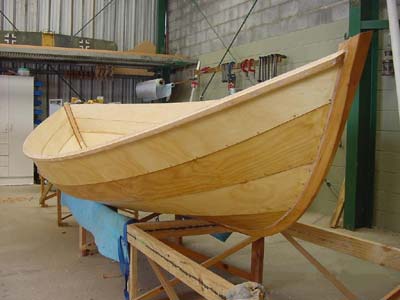Losing Momentum
Ian lay against the wall of the workshop, seated on an off-cut
of plywood placed across a pair of sawhorses. He raised his
eyes from the jumble of boating magazines on his lap and contemplated
the scene within the building.
Mike Rowe was completing the final stages of the scarph joint
which had changed two sheets of 9mm plywood into a single 4.8metre
panel. Ian had been able to watch the whole operation as though
a fly on the wall, his friend being almost unaware of another
person in the shop.
What interested Ian was the speed with which the scarphing
operation had taken place, despite Mike having been interrupted
by a customer call.
“Hey Mike,” he called, “Do you realize that
you would have taken three weeks to do that job a few years
ago, but that that one took less than fifteen minutes?”
Mike Rowe glanced over at him as he tossed a pair of disposable
gloves into the bin and washed his hands in the grubby wall-mounted
sink. “The reason that I used to be so slow,” said
Mike, “was that I used to be frightened of making a mistake.
I would plan the whole operation (whatever it might be) in great
detail, but the more I planned, the more complicated it became
in my head. Fear of wrecking the job really slowed me down.”
Warming to the theme, Mike continued. “I’m still
concerned about making errors, but part of the learning process
involves understanding that mistakes and accidents will occur,
but that just about anything can be fixed properly.”
Having dragged his body away from the empty coffee cup and
stack of books, Ian cast a critical eye over the scarphing job.
He noted that although it was not perfect, it was neat and very
accurate. The feather-edge of the plywood scarph showed some
unevenness where the razor-sharp blade of the block plane had
jagged the wood fibres – but these were minor errors of
no structural concern.
“It is the ‘average’ of the job which matters,
not the occasional fault,” observed Mike. “If you
just keep trying to be accurate and thorough the job will work
out well, despite the saw wandering or the chisel slipping”.
Mike flicked on the kettle. “What used to happen was
that I’d become discouraged by mistakes. Then I would
either walk away for a week, or I would drop my standards because
I thought the job was no longer perfect.”
Nodding slowly, Ian reflected on the number of times he had
experienced the same feelings…
Let us leave this imaginary pair in the imaginary workshop,
but think about their story. Once you lose momentum on a project,
it is very difficult to get going again without encouragement.
Most amateur builders work alone, juggling work, family, finances
and time. A minor setback can seem disasterous, and it is no
wonder that some boatbuilding jobs are never completed. Others
get finished, but in a slap-dash manner because reality hasn’t
matched the dream.
Don’t lose sight of the dream, but be realistic about
the outcome. As long as the wandering saw keeps coming back
to the line, the overall result will be good, and the care will
show. Attend to errors where they occur, but keep on working
with accuracy in mind.


